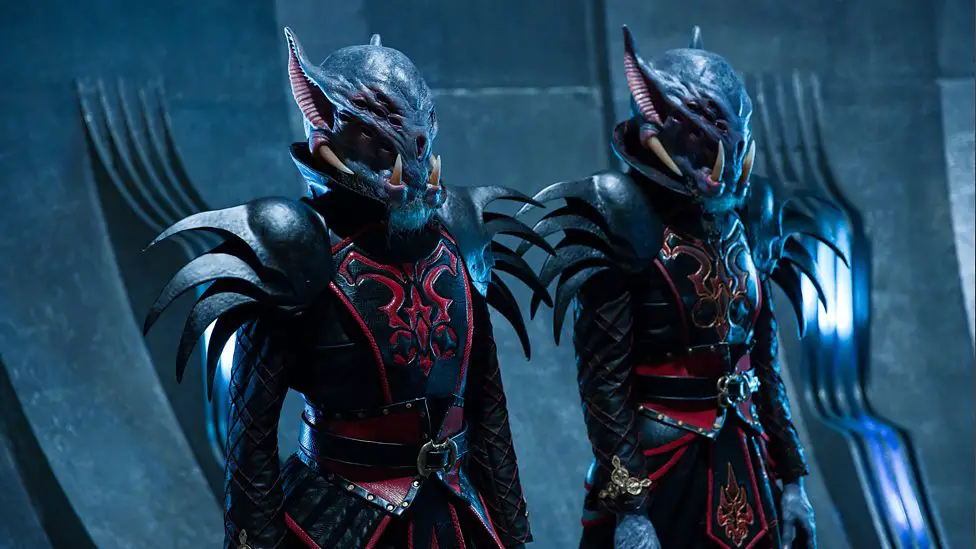; Date: Mon Dec 03 2018
Tags: Doctor Who »»»» Season 11 »»»»
Doctor Who Season 11 is a big departure from what Doctor Who has become. The obvious change is that The Doctor is female, duh. On YouTube and surely elsewhere there's been a big negative backlash against this and other changes in Doctor Who -- complaints about politically-correct-social-justice-being-shoved-down-our-throats are common in YouTube reviews of Season 11 episodes. But some of these reviewers are simply complaining how different it is, and some have complained about the lack of the typical monsters. Instead we're being shown creatures who look like monsters, but are not, and we're shown humans who are committing great crimes.

In the lead-up to Season 11 we were told clearly by Chibnall and others in the know that Season 11 would be a bigger change than just the female Doctor. The situations would be all new, and there would not be any returning monsters or other characters. The folks who want the female Doctor to meet River Song, or Rose, or Missy, they're outta luck. And those itching for a Dalek smash-up, or Cybermen, or revisiting Gallifrey, they're outta luck. See:
- Chibnall suggests/confirms no Daleks this year in Doctor Who
- Doctor #13, new faces/worlds/times means no old villians means what?
In Kerblam we did not get the typical set-up. The story led us into the bowels of a giant corporation that was exploiting its human workers, seemingly. In so many previous Doctor Who episodes that general manager of the warehouse facility would have been an evil corporate manager callously killing his employees for some reason. But it was a little like The Robots of Death with a rogue human reprogramming the Robots. More importantly in this case the "System" was not the evil influence, instead the System detected the problem and called out for help.
In Demons of the Punjab we met these time traveling aliens with advanced technology that looked like monsters. We were even told they were super-assassins from the far distant past, and that we should be afraid of them. Instead it turned out they had reformed their ways, and were traveling the universe on a sort of hospice caring-for-the-dying mission to atone for their sins.
The real monster of Punjab were instead the humans. We are stupid aren't we, always inventing ways to divide ourselves into warring camps and go killing each other when we'd previously been living side-by-side in harmony. Similar issues have arisen time and again in culture after culture.
The same was in Rosa -- yeah, there was a time traveling racist trying to muck up the timelines, but the real villain of the story was the pattern of racism in the old South. That time traveling racist could have been absent from the story and it would be the same.
In Arachnids in the UK were the giant spiders the monsters? Nope, they were unfortunate victims of bad business practices gone awry. The monster was the not-Donald-Trump character whose waste disposal business cut too many corners, leading to an infestation of mutated giant spiders who were simply confused.
Monster of the Week
Since the revival, Doctor Who has been filled with story arcs where clues are scattered all through a season in seriously timey-wimey ways. It started with Bad Wolf creating itself from the time Rose looked into the time vortex, and spreading signs of itself all through the universe leading to the moment when Rose looked into the time vortex.
Then there was the crack in the wall -- the Silence -- the whole crazy inside-out story of River Song and the Doctor -- and Bill Potts and her water puddle Girlfriend -- and don't get me started on The Impossible Girl.
We couldn't go a season without a visitation with Daleks, and Cybermen, and for some reason that blue guy had to turn up several times over a couple seasons just because, and what was that about the Sisterhood of Karn? It goes on and on and on.
In the earliest Doctor Who we didn't have that. Instead we had interesting intriguing stories.
For example, in Planet of the Giants we had the TARDIS accidentally materialize in a tiny size, and the TARDIS crew were running around the backyard of an English house dealing with dangers like ants and puppy dogs. Oh, and they learned about a scientist who'd developed this highly poisonous fertilizer, and a business man who killed the scientist, and the necessity of telling the authorities, and so on.
THAT was an interesting story that did not involve any kind of monster -- except for the human monsters.
And in The Celestial Toymaker we were shown an all-powerful God who ruled an alternate universe, but was immensely bored. He captured the TARDIS crew to set them with some puzzle/challenges, hoping to amuse himself by challenging The Doctor to a game. Nothing is worse than a bored God, and otherwise there was no monsters.
Season 11 has had no Monster of the Week episodes
Maybe the BBC decided that Doctor Who had become too formulaic.
Witness that in Kerblam we expected the General Manager of the factory to be the villain, for some motive not yet determined fiddling with the Robots for some foul purpose. Or maybe that could have been an entry point for Missy who might be mind-controlling the Kerblam general manager in a madcap scheme to destroy the universe or something.
In a YouTube review I even heard one of the Doctor-Who-is-full-of-rubbish-now reviewers complaining about Grace's entrance in It Takes You Away. That reviewer thought it would was a wasted opportunity, that instead of Grace it should have been Missy. As if Doctor Who must always be about the returning threat of the recurring characters.
In an infinite universe, why should The TARDIS always take The Doctor to visit folks or situations the Doctor has already been to see? Why wouldn't The TARDIS bring The Doctor to new scenes, locales, cultures, or situations?











